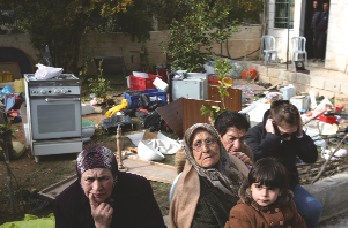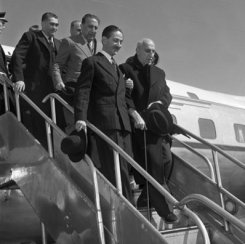Obama Must Choose Between Peace and The “Special Relationship”
Rachelle Marshall

The al-Kurd family, whose house was taken over by Jewish
settlers (standing in doorway), sits in the courtyard of their home
in the Sheikh Jarrah neighborhood of Arab East Jerusalem, Dec. 2,
2009. AFP PHOTO/AHMAD GHARABLI
Our posture with Israel has weakened, our hope to strengthen the Palestinians has fallen back, and our credibility in the Arab world has been damaged. We are the victims of events rather than masters of events. —Robert Malley, Clinton administration peace negotiator, The New York Times, Nov. 6, 2009.
What we are doing here is evil. —Rachel Corrie in a letter from Gaza to her mother shortly before she was crushed to death by an Israeli bulldozer in March 2003.
What Rachel Corrie referred to as “evil” was America’s support for Israel despite its crimes against the Palestinians, crimes she was witnessing at first hand in Gaza. The “special relationship” with Israel that guarantees such support has been a constant of U.S. foreign policy since 1967 and is a relationship in which Israel is the sole beneficiary and often the stronger partner. Watching to make sure this policy remains in place is a powerful pro-Israel lobby that most elected officials dare not oppose. President Barack Obama’s pre-election vow to abide by the “special relationship” virtually assured Israeli leaders they could rely on Washington’s full diplomatic, military, and financial support even if they openly defy its wishes.


























